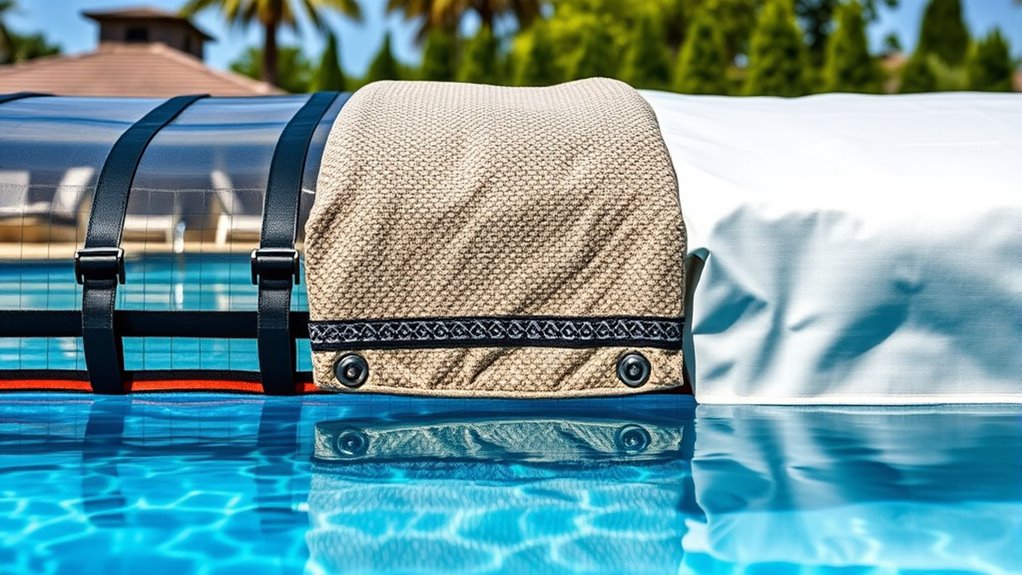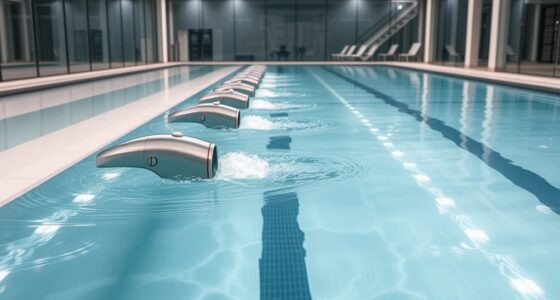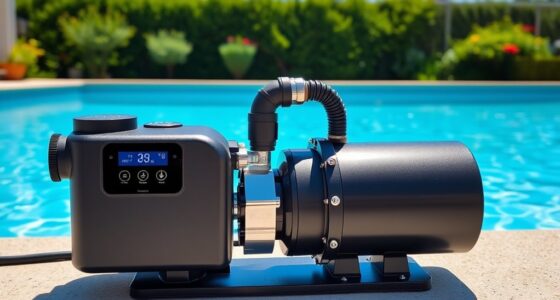A pool cover helps keep your pool safe, clean, and energy-efficient by reducing debris, evaporation, and heat loss. There are different types, such as solar covers for heating, safety covers to prevent accidents, and winter covers for off-season protection. Choosing the right one depends on your climate, goals, and budget. Proper installation and regular maintenance guarantee longevity. Keep exploring to discover how to select and care for the perfect cover for your needs.
Key Takeaways
- Different pool cover types serve specific purposes like heating, safety, winter protection, or convenience.
- Choose a cover based on climate, desired benefits, and material durability for long-lasting performance.
- Proper installation, regular cleaning, and maintenance extend cover lifespan and effectiveness.
- Additional features like automatic systems, solar reels, and safety locks enhance ease of use and security.
- Consider local regulations and safety features to ensure the cover complies and maximizes pool safety.
Types of Pool Covers

Are you wondering which type of pool cover is right for your needs? There are several options to contemplate. Solar covers, also called bubble covers, trap heat and reduce evaporation, helping keep your pool warm and saving energy. Safety covers are sturdy, durable, and designed to prevent accidents by blocking access to the pool, making them ideal for families with kids or pets. Automatic covers operate with a motor, sliding open or closed at the push of a button, offering convenience and security. Winter covers protect your pool during the off-season, shielding against debris and harsh weather. Each type serves a specific purpose, so think about your main priorities—whether heat retention, safety, convenience, or protection—to choose the best fit. Additionally, organic and natural juices can be a healthy way to stay hydrated during poolside relaxation. Understanding different pool cover materials can help you select the most durable and effective option for your climate and usage needs.
Benefits of Using a Pool Cover

Using a pool cover offers numerous practical benefits that can improve your swimming experience and help you maintain your pool more efficiently. It reduces water evaporation, saving you money on water bills and ensuring the pool stays full. A cover also helps keep debris, dirt, and leaves out of your pool, so you spend less time cleaning. Additionally, it retains heat, allowing your pool to warm up faster and stay warmer longer, which extends your swimming season. Using a cover minimizes chemical loss, helping you keep the water balanced and reducing chemical costs. It also enhances safety by preventing accidental falls, especially for children and pets. Regularly using a pool cover aligns with mindful decluttering principles by reducing unnecessary clutter and promoting a cleaner, safer space around your pool area. Furthermore, a properly fitted cover ensures maximum efficiency and protection, contributing to long-term savings and pool health.
How to Choose the Right Pool Cover

Choosing the right pool cover involves considering several key factors to guarantee it meets your needs effectively. First, think about your climate—if you experience harsh winters, a durable, heavy-duty cover is essential. Next, determine your primary goal: safety, energy savings, or cleanliness. The table below highlights some options:
| Feature | Best Use |
|---|---|
| Solar Cover | Heating and energy efficiency |
| Safety Cover | Child and pet safety |
| Winter Cover | Protecting during off-season |
| Automatic Cover | Convenience and security |
| Mesh Cover | Debris filtration |
Match your priorities with these features to select the ideal cover, ensuring longevity and functionality tailored to your pool. Additionally, consider material durability to ensure the cover withstands your specific weather conditions. Understanding the different types of covers can help you make a more informed decision that aligns with your needs, especially since electric power options like electric covers are becoming increasingly popular for added convenience. Incorporating aesthetic design elements can also enhance your pool area’s overall appearance while maintaining functionality. Furthermore, selecting a cover made with advanced materials can provide extra protection against UV rays and chemical exposure, extending the lifespan of your cover and pool equipment.
Installation and Maintenance Tips

Proper installation and regular maintenance are essential to guarantee your pool cover functions effectively and lasts for years. When installing, follow the manufacturer’s instructions carefully, ensuring the cover fits snugly over your pool and is securely anchored. Check for any tears or damage during installation and repair them promptly. To maintain your cover, clean it regularly with mild soap and water, avoiding harsh chemicals that can degrade materials. Remove debris like leaves and dirt to prevent mold and mildew buildup. During the off-season, store the cover in a cool, dry place if it’s removable, and inspect it annually for signs of wear. Proper care extends your cover’s lifespan and keeps your pool safe and protected year-round.
Additional Features and Accessories

Enhancing your pool cover with additional features and accessories can substantially improve its functionality and ease of use. Consider adding automatic opening and closing systems for convenience, saving you time and effort. Solar-powered reel systems make handling large covers easier, especially if you have a sizable pool. Anchors and tie-downs provide extra security in windy conditions, preventing accidental removal or damage. Insulating blankets or bubble covers can boost heat retention, reducing heating costs. Adding a cover pump helps remove rainwater that collects on the cover, preventing sagging and debris buildup. Some accessories, like safety alarms or child-proof locks, enhance security and peace of mind. Understanding pool cover materials can help you select the most durable options for your needs. These features not only extend your cover’s lifespan but also make pool maintenance more straightforward and efficient. Incorporating vetted pool cover reviews can guide you toward the most reliable and effective products on the market. Additionally, awareness of local regulations can ensure your pool cover setup complies with safety standards, providing extra protection and peace of mind. Using high-quality materials suited for outdoor use can further improve the longevity and performance of your pool cover. Exploring additional accessories for pool covers can also increase convenience and safety during installation and use.
Frequently Asked Questions
How Long Do Pool Covers Typically Last?
You might wonder how long your pool cover will last. Typically, a quality cover lasts around 5 to 10 years, depending on usage, climate, and maintenance. Regularly cleaning and properly storing it can extend its lifespan. Keep an eye out for signs of wear, like tears or fading, and replace it when necessary to guarantee your pool stays protected and in good condition year-round.
Are There Eco-Friendly Pool Cover Options Available?
You’re wondering if eco-friendly pool cover options exist. Yes, they do! You can find covers made from recycled materials or those designed to be biodegradable, reducing environmental impact. Look for products labeled as eco-friendly or sustainable. These covers work just as well as traditional ones, helping you save energy and water while protecting your pool. Making a switch supports a greener lifestyle and contributes to environmental conservation efforts.
Can Pool Covers Be Customized for Unique Pool Shapes?
You can definitely customize pool covers for your unique pool shape. Manufacturers often offer tailored options, including custom sizes and shapes, guaranteeing a perfect fit. You simply need to provide detailed measurements or drawings of your pool. Custom covers not only improve safety and efficiency but also enhance the appearance. By working with a professional, you ensure your pool cover matches your specific design and requirements, giving you peace of mind and a seamless look.
What Safety Standards Do Pool Covers Meet?
Imagine your pool cover as a superhero cape—ready to save lives. You’ll find that most covers meet strict safety standards like ASTM F1346, ensuring they’re strong enough to hold weight and prevent accidental drownings. These standards push manufacturers to create reliable, durable covers. So, when you choose one, you’re not just covering your pool; you’re donning it with a safety shield that passes rigorous testing for peace of mind.
How Do I Store My Pool Cover During Winter?
You should store your pool cover properly during winter to keep it in good condition. First, remove the cover carefully, making sure to rinse off any dirt or debris. Fold it neatly or roll it up, avoiding sharp creases. Store it in a cool, dry place away from direct sunlight, such as a shed or garage. This helps prevent damage and extends the cover’s lifespan for next season’s use.
Conclusion
Did you know that using the right pool cover can save you money and keep your pool cleaner? Many believe that covers only protect against debris, but they also help conserve energy and reduce chemical use. By choosing the right cover and maintaining it properly, you could even lower your energy bills. So, don’t just cover your pool—invest in a cover that truly works for you. You might find it’s the best decision you’ve made for your pool’s health.









